Leadership and Management in the Service Industry
VerifiedAdded on 2022/11/24
|13
|3434
|424
AI Summary
This document explores the role of leadership and management in the service industry, specifically focusing on The Merchant Hotel. It reviews classical management theories, evaluates management and leadership styles, and analyzes the impact of extrinsic and intrinsic factors on management style and structure. Additionally, it discusses the current and future leadership and management skills required in the context of The Merchant Hotel.
Contribute Materials
Your contribution can guide someone’s learning journey. Share your
documents today.
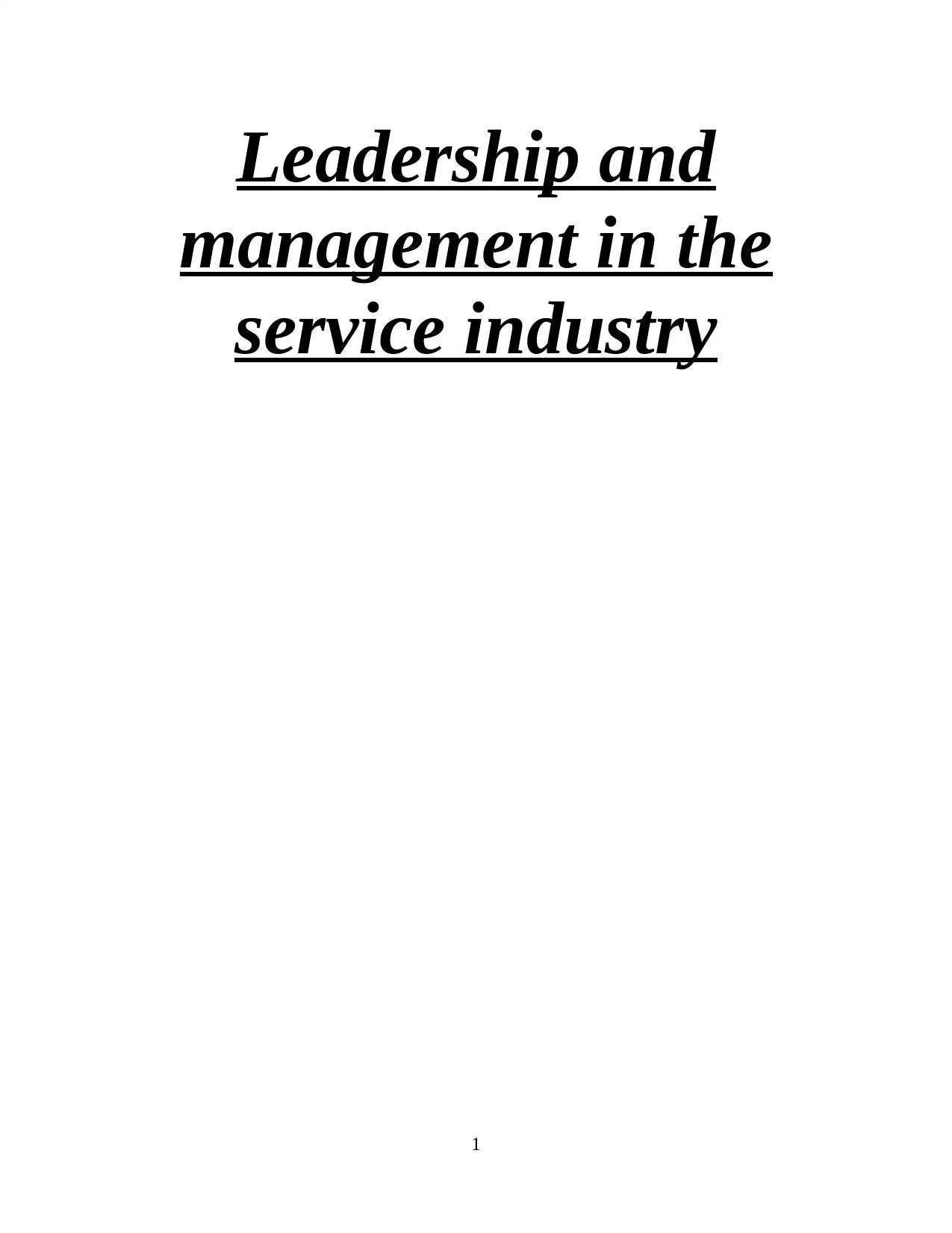
Leadership and
management in the
service industry
1
management in the
service industry
1
Secure Best Marks with AI Grader
Need help grading? Try our AI Grader for instant feedback on your assignments.
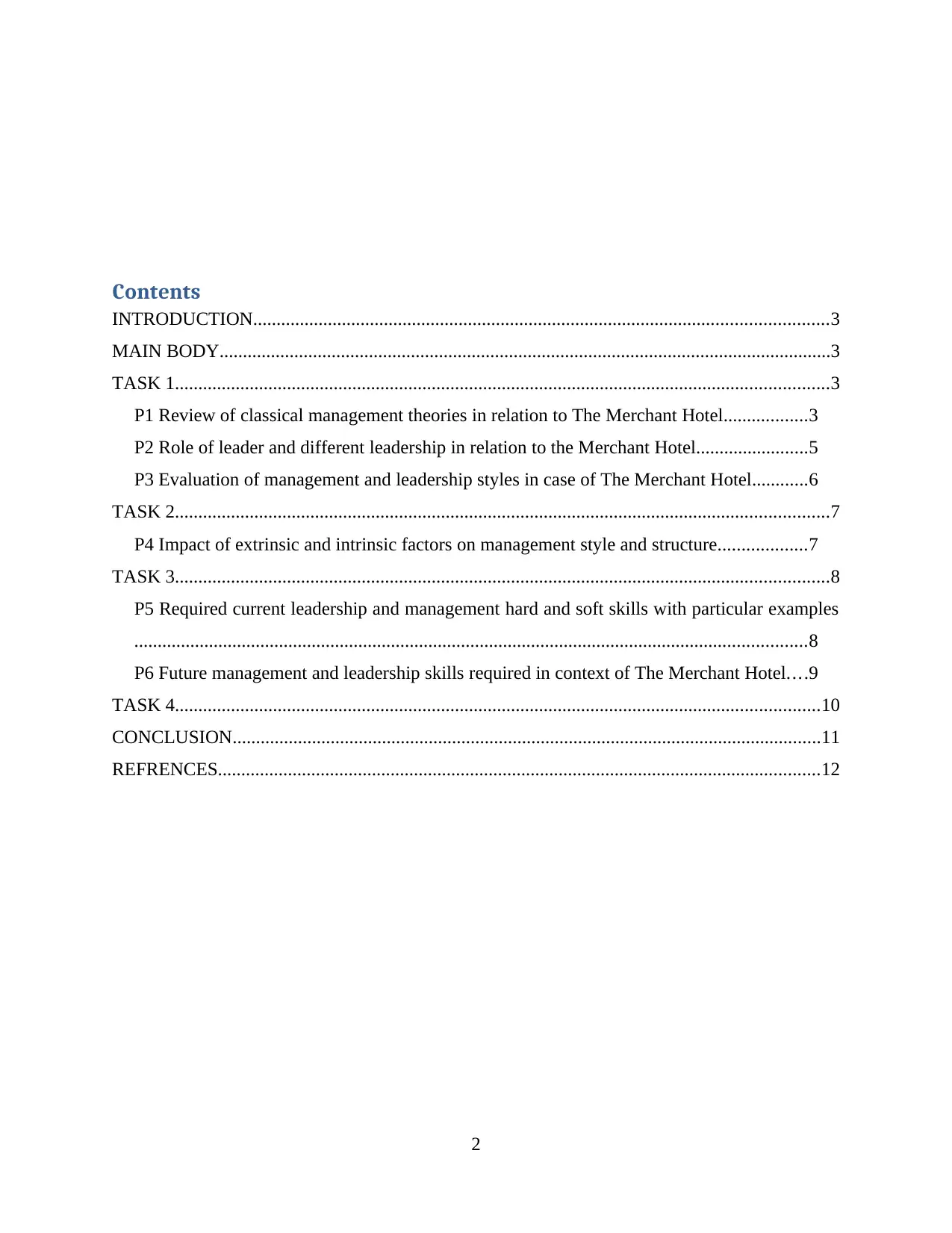
Contents
INTRODUCTION...........................................................................................................................3
MAIN BODY...................................................................................................................................3
TASK 1............................................................................................................................................3
P1 Review of classical management theories in relation to The Merchant Hotel..................3
P2 Role of leader and different leadership in relation to the Merchant Hotel........................5
P3 Evaluation of management and leadership styles in case of The Merchant Hotel............6
TASK 2............................................................................................................................................7
P4 Impact of extrinsic and intrinsic factors on management style and structure...................7
TASK 3............................................................................................................................................8
P5 Required current leadership and management hard and soft skills with particular examples
................................................................................................................................................8
P6 Future management and leadership skills required in context of The Merchant Hotel....9
TASK 4..........................................................................................................................................10
CONCLUSION..............................................................................................................................11
REFRENCES.................................................................................................................................12
2
INTRODUCTION...........................................................................................................................3
MAIN BODY...................................................................................................................................3
TASK 1............................................................................................................................................3
P1 Review of classical management theories in relation to The Merchant Hotel..................3
P2 Role of leader and different leadership in relation to the Merchant Hotel........................5
P3 Evaluation of management and leadership styles in case of The Merchant Hotel............6
TASK 2............................................................................................................................................7
P4 Impact of extrinsic and intrinsic factors on management style and structure...................7
TASK 3............................................................................................................................................8
P5 Required current leadership and management hard and soft skills with particular examples
................................................................................................................................................8
P6 Future management and leadership skills required in context of The Merchant Hotel....9
TASK 4..........................................................................................................................................10
CONCLUSION..............................................................................................................................11
REFRENCES.................................................................................................................................12
2
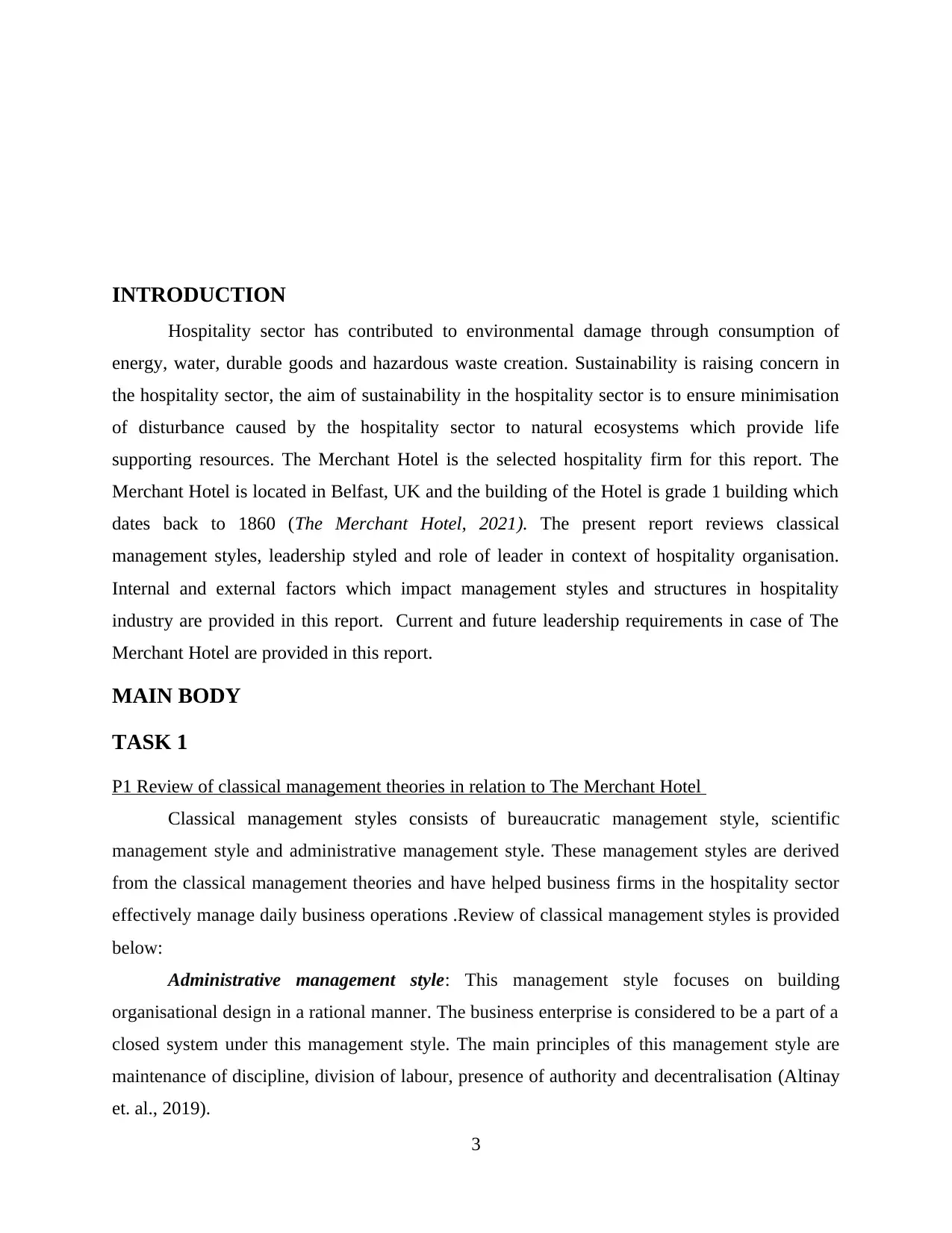
INTRODUCTION
Hospitality sector has contributed to environmental damage through consumption of
energy, water, durable goods and hazardous waste creation. Sustainability is raising concern in
the hospitality sector, the aim of sustainability in the hospitality sector is to ensure minimisation
of disturbance caused by the hospitality sector to natural ecosystems which provide life
supporting resources. The Merchant Hotel is the selected hospitality firm for this report. The
Merchant Hotel is located in Belfast, UK and the building of the Hotel is grade 1 building which
dates back to 1860 (The Merchant Hotel, 2021). The present report reviews classical
management styles, leadership styled and role of leader in context of hospitality organisation.
Internal and external factors which impact management styles and structures in hospitality
industry are provided in this report. Current and future leadership requirements in case of The
Merchant Hotel are provided in this report.
MAIN BODY
TASK 1
P1 Review of classical management theories in relation to The Merchant Hotel
Classical management styles consists of bureaucratic management style, scientific
management style and administrative management style. These management styles are derived
from the classical management theories and have helped business firms in the hospitality sector
effectively manage daily business operations .Review of classical management styles is provided
below:
Administrative management style: This management style focuses on building
organisational design in a rational manner. The business enterprise is considered to be a part of a
closed system under this management style. The main principles of this management style are
maintenance of discipline, division of labour, presence of authority and decentralisation (Altinay
et. al., 2019).
3
Hospitality sector has contributed to environmental damage through consumption of
energy, water, durable goods and hazardous waste creation. Sustainability is raising concern in
the hospitality sector, the aim of sustainability in the hospitality sector is to ensure minimisation
of disturbance caused by the hospitality sector to natural ecosystems which provide life
supporting resources. The Merchant Hotel is the selected hospitality firm for this report. The
Merchant Hotel is located in Belfast, UK and the building of the Hotel is grade 1 building which
dates back to 1860 (The Merchant Hotel, 2021). The present report reviews classical
management styles, leadership styled and role of leader in context of hospitality organisation.
Internal and external factors which impact management styles and structures in hospitality
industry are provided in this report. Current and future leadership requirements in case of The
Merchant Hotel are provided in this report.
MAIN BODY
TASK 1
P1 Review of classical management theories in relation to The Merchant Hotel
Classical management styles consists of bureaucratic management style, scientific
management style and administrative management style. These management styles are derived
from the classical management theories and have helped business firms in the hospitality sector
effectively manage daily business operations .Review of classical management styles is provided
below:
Administrative management style: This management style focuses on building
organisational design in a rational manner. The business enterprise is considered to be a part of a
closed system under this management style. The main principles of this management style are
maintenance of discipline, division of labour, presence of authority and decentralisation (Altinay
et. al., 2019).
3
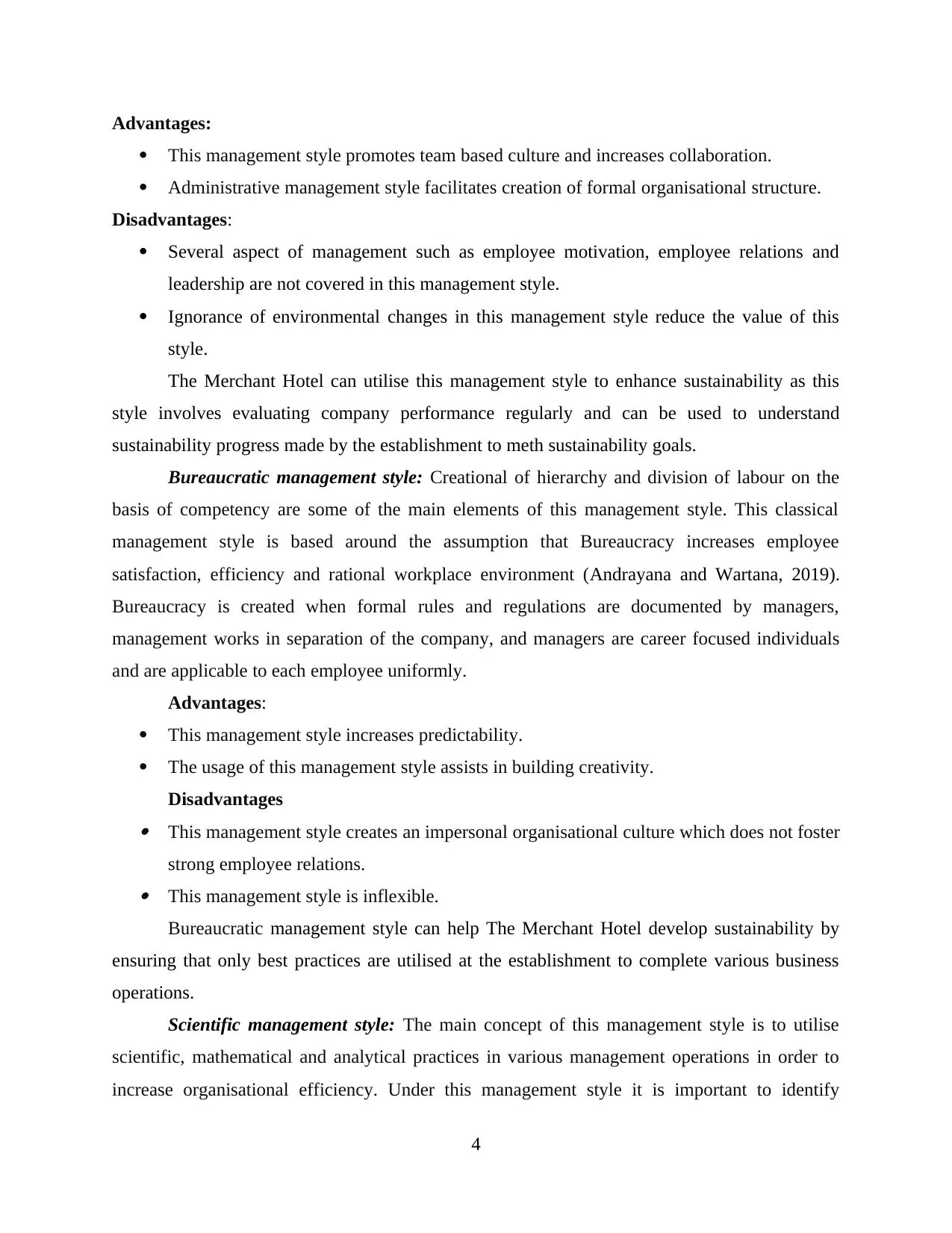
Advantages:
This management style promotes team based culture and increases collaboration.
Administrative management style facilitates creation of formal organisational structure.
Disadvantages:
Several aspect of management such as employee motivation, employee relations and
leadership are not covered in this management style.
Ignorance of environmental changes in this management style reduce the value of this
style.
The Merchant Hotel can utilise this management style to enhance sustainability as this
style involves evaluating company performance regularly and can be used to understand
sustainability progress made by the establishment to meth sustainability goals.
Bureaucratic management style: Creational of hierarchy and division of labour on the
basis of competency are some of the main elements of this management style. This classical
management style is based around the assumption that Bureaucracy increases employee
satisfaction, efficiency and rational workplace environment (Andrayana and Wartana, 2019).
Bureaucracy is created when formal rules and regulations are documented by managers,
management works in separation of the company, and managers are career focused individuals
and are applicable to each employee uniformly.
Advantages:
This management style increases predictability.
The usage of this management style assists in building creativity.
Disadvantages This management style creates an impersonal organisational culture which does not foster
strong employee relations. This management style is inflexible.
Bureaucratic management style can help The Merchant Hotel develop sustainability by
ensuring that only best practices are utilised at the establishment to complete various business
operations.
Scientific management style: The main concept of this management style is to utilise
scientific, mathematical and analytical practices in various management operations in order to
increase organisational efficiency. Under this management style it is important to identify
4
This management style promotes team based culture and increases collaboration.
Administrative management style facilitates creation of formal organisational structure.
Disadvantages:
Several aspect of management such as employee motivation, employee relations and
leadership are not covered in this management style.
Ignorance of environmental changes in this management style reduce the value of this
style.
The Merchant Hotel can utilise this management style to enhance sustainability as this
style involves evaluating company performance regularly and can be used to understand
sustainability progress made by the establishment to meth sustainability goals.
Bureaucratic management style: Creational of hierarchy and division of labour on the
basis of competency are some of the main elements of this management style. This classical
management style is based around the assumption that Bureaucracy increases employee
satisfaction, efficiency and rational workplace environment (Andrayana and Wartana, 2019).
Bureaucracy is created when formal rules and regulations are documented by managers,
management works in separation of the company, and managers are career focused individuals
and are applicable to each employee uniformly.
Advantages:
This management style increases predictability.
The usage of this management style assists in building creativity.
Disadvantages This management style creates an impersonal organisational culture which does not foster
strong employee relations. This management style is inflexible.
Bureaucratic management style can help The Merchant Hotel develop sustainability by
ensuring that only best practices are utilised at the establishment to complete various business
operations.
Scientific management style: The main concept of this management style is to utilise
scientific, mathematical and analytical practices in various management operations in order to
increase organisational efficiency. Under this management style it is important to identify
4
Secure Best Marks with AI Grader
Need help grading? Try our AI Grader for instant feedback on your assignments.
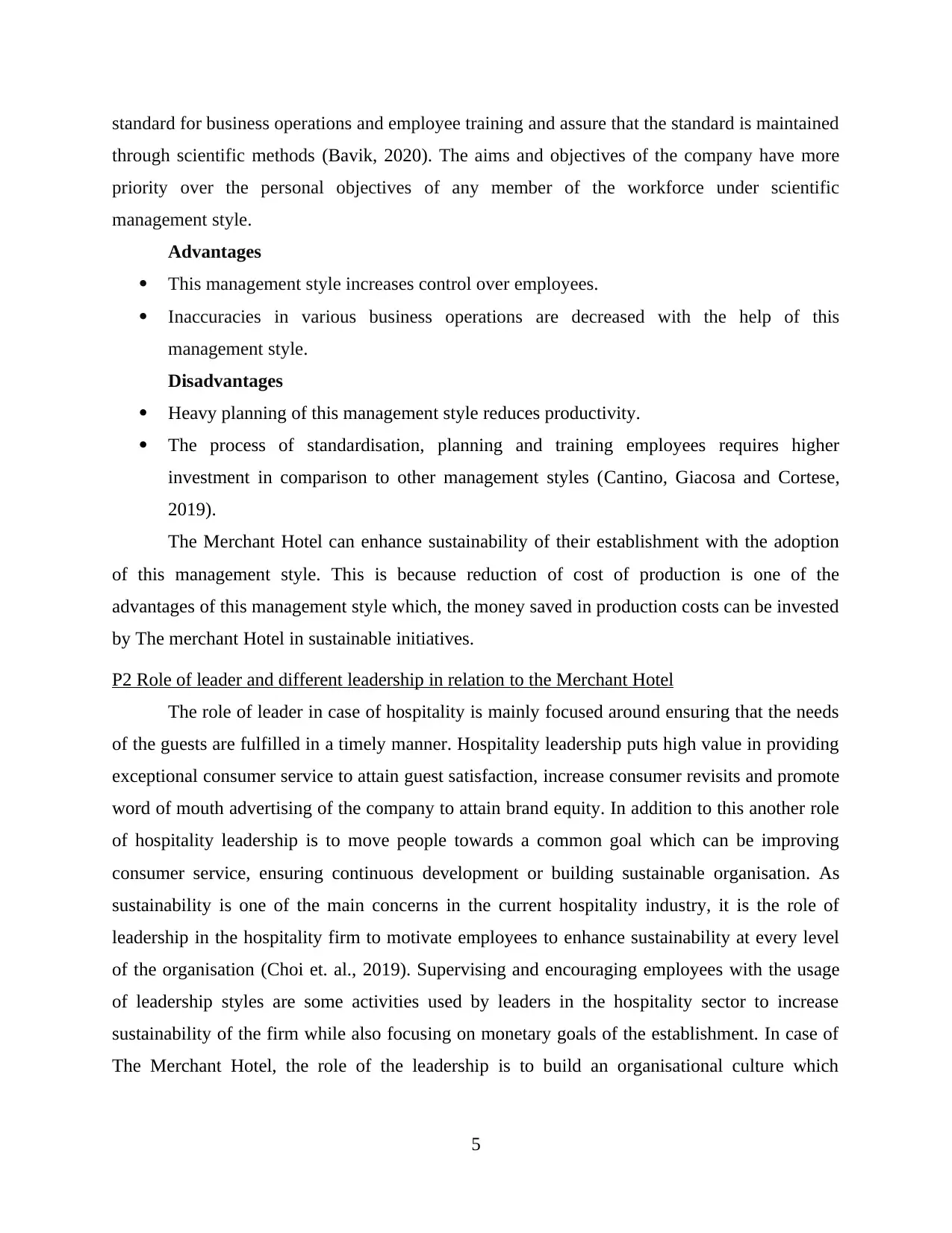
standard for business operations and employee training and assure that the standard is maintained
through scientific methods (Bavik, 2020). The aims and objectives of the company have more
priority over the personal objectives of any member of the workforce under scientific
management style.
Advantages
This management style increases control over employees.
Inaccuracies in various business operations are decreased with the help of this
management style.
Disadvantages
Heavy planning of this management style reduces productivity.
The process of standardisation, planning and training employees requires higher
investment in comparison to other management styles (Cantino, Giacosa and Cortese,
2019).
The Merchant Hotel can enhance sustainability of their establishment with the adoption
of this management style. This is because reduction of cost of production is one of the
advantages of this management style which, the money saved in production costs can be invested
by The merchant Hotel in sustainable initiatives.
P2 Role of leader and different leadership in relation to the Merchant Hotel
The role of leader in case of hospitality is mainly focused around ensuring that the needs
of the guests are fulfilled in a timely manner. Hospitality leadership puts high value in providing
exceptional consumer service to attain guest satisfaction, increase consumer revisits and promote
word of mouth advertising of the company to attain brand equity. In addition to this another role
of hospitality leadership is to move people towards a common goal which can be improving
consumer service, ensuring continuous development or building sustainable organisation. As
sustainability is one of the main concerns in the current hospitality industry, it is the role of
leadership in the hospitality firm to motivate employees to enhance sustainability at every level
of the organisation (Choi et. al., 2019). Supervising and encouraging employees with the usage
of leadership styles are some activities used by leaders in the hospitality sector to increase
sustainability of the firm while also focusing on monetary goals of the establishment. In case of
The Merchant Hotel, the role of the leadership is to build an organisational culture which
5
through scientific methods (Bavik, 2020). The aims and objectives of the company have more
priority over the personal objectives of any member of the workforce under scientific
management style.
Advantages
This management style increases control over employees.
Inaccuracies in various business operations are decreased with the help of this
management style.
Disadvantages
Heavy planning of this management style reduces productivity.
The process of standardisation, planning and training employees requires higher
investment in comparison to other management styles (Cantino, Giacosa and Cortese,
2019).
The Merchant Hotel can enhance sustainability of their establishment with the adoption
of this management style. This is because reduction of cost of production is one of the
advantages of this management style which, the money saved in production costs can be invested
by The merchant Hotel in sustainable initiatives.
P2 Role of leader and different leadership in relation to the Merchant Hotel
The role of leader in case of hospitality is mainly focused around ensuring that the needs
of the guests are fulfilled in a timely manner. Hospitality leadership puts high value in providing
exceptional consumer service to attain guest satisfaction, increase consumer revisits and promote
word of mouth advertising of the company to attain brand equity. In addition to this another role
of hospitality leadership is to move people towards a common goal which can be improving
consumer service, ensuring continuous development or building sustainable organisation. As
sustainability is one of the main concerns in the current hospitality industry, it is the role of
leadership in the hospitality firm to motivate employees to enhance sustainability at every level
of the organisation (Choi et. al., 2019). Supervising and encouraging employees with the usage
of leadership styles are some activities used by leaders in the hospitality sector to increase
sustainability of the firm while also focusing on monetary goals of the establishment. In case of
The Merchant Hotel, the role of the leadership is to build an organisational culture which
5
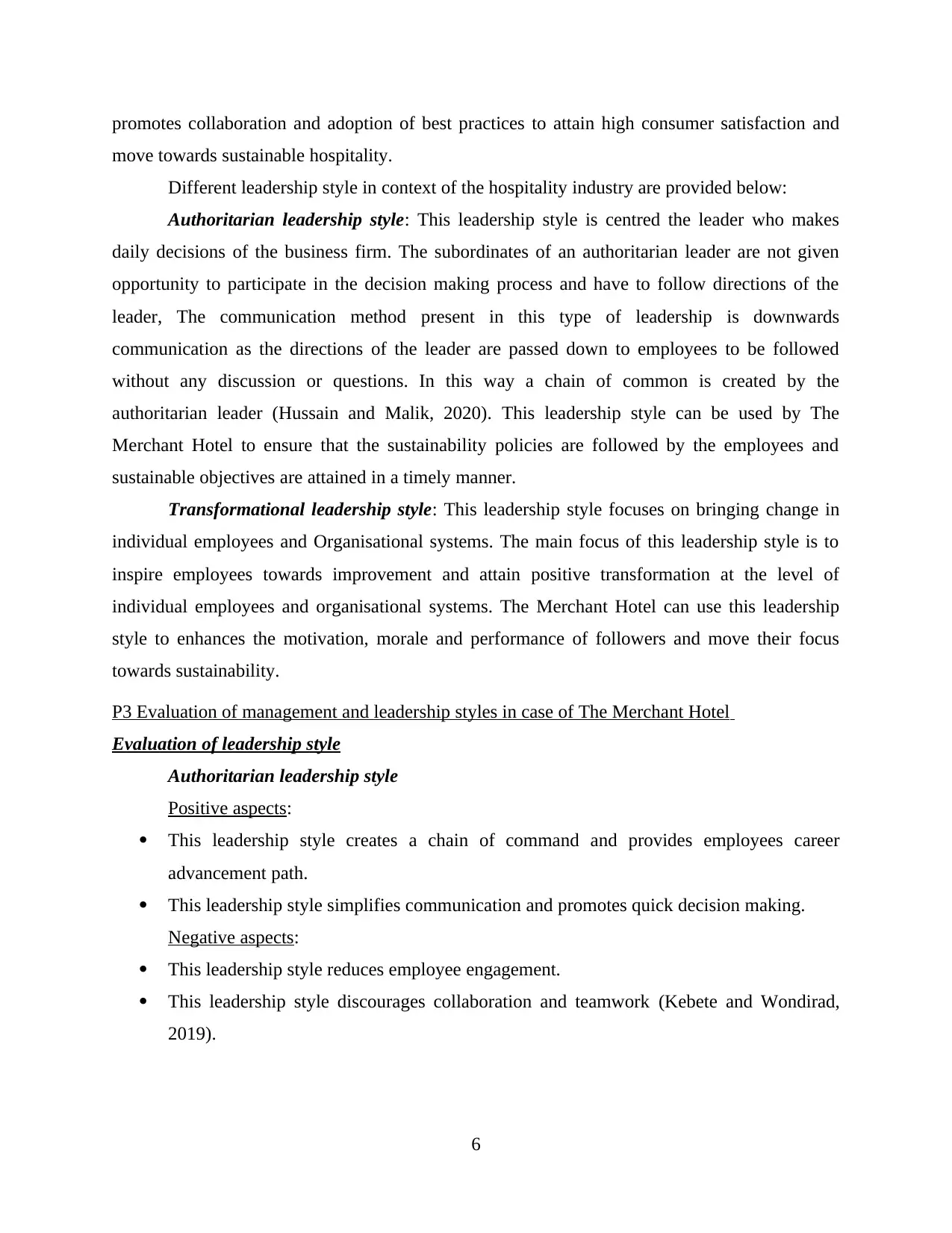
promotes collaboration and adoption of best practices to attain high consumer satisfaction and
move towards sustainable hospitality.
Different leadership style in context of the hospitality industry are provided below:
Authoritarian leadership style: This leadership style is centred the leader who makes
daily decisions of the business firm. The subordinates of an authoritarian leader are not given
opportunity to participate in the decision making process and have to follow directions of the
leader, The communication method present in this type of leadership is downwards
communication as the directions of the leader are passed down to employees to be followed
without any discussion or questions. In this way a chain of common is created by the
authoritarian leader (Hussain and Malik, 2020). This leadership style can be used by The
Merchant Hotel to ensure that the sustainability policies are followed by the employees and
sustainable objectives are attained in a timely manner.
Transformational leadership style: This leadership style focuses on bringing change in
individual employees and Organisational systems. The main focus of this leadership style is to
inspire employees towards improvement and attain positive transformation at the level of
individual employees and organisational systems. The Merchant Hotel can use this leadership
style to enhances the motivation, morale and performance of followers and move their focus
towards sustainability.
P3 Evaluation of management and leadership styles in case of The Merchant Hotel
Evaluation of leadership style
Authoritarian leadership style
Positive aspects:
This leadership style creates a chain of command and provides employees career
advancement path.
This leadership style simplifies communication and promotes quick decision making.
Negative aspects:
This leadership style reduces employee engagement.
This leadership style discourages collaboration and teamwork (Kebete and Wondirad,
2019).
6
move towards sustainable hospitality.
Different leadership style in context of the hospitality industry are provided below:
Authoritarian leadership style: This leadership style is centred the leader who makes
daily decisions of the business firm. The subordinates of an authoritarian leader are not given
opportunity to participate in the decision making process and have to follow directions of the
leader, The communication method present in this type of leadership is downwards
communication as the directions of the leader are passed down to employees to be followed
without any discussion or questions. In this way a chain of common is created by the
authoritarian leader (Hussain and Malik, 2020). This leadership style can be used by The
Merchant Hotel to ensure that the sustainability policies are followed by the employees and
sustainable objectives are attained in a timely manner.
Transformational leadership style: This leadership style focuses on bringing change in
individual employees and Organisational systems. The main focus of this leadership style is to
inspire employees towards improvement and attain positive transformation at the level of
individual employees and organisational systems. The Merchant Hotel can use this leadership
style to enhances the motivation, morale and performance of followers and move their focus
towards sustainability.
P3 Evaluation of management and leadership styles in case of The Merchant Hotel
Evaluation of leadership style
Authoritarian leadership style
Positive aspects:
This leadership style creates a chain of command and provides employees career
advancement path.
This leadership style simplifies communication and promotes quick decision making.
Negative aspects:
This leadership style reduces employee engagement.
This leadership style discourages collaboration and teamwork (Kebete and Wondirad,
2019).
6
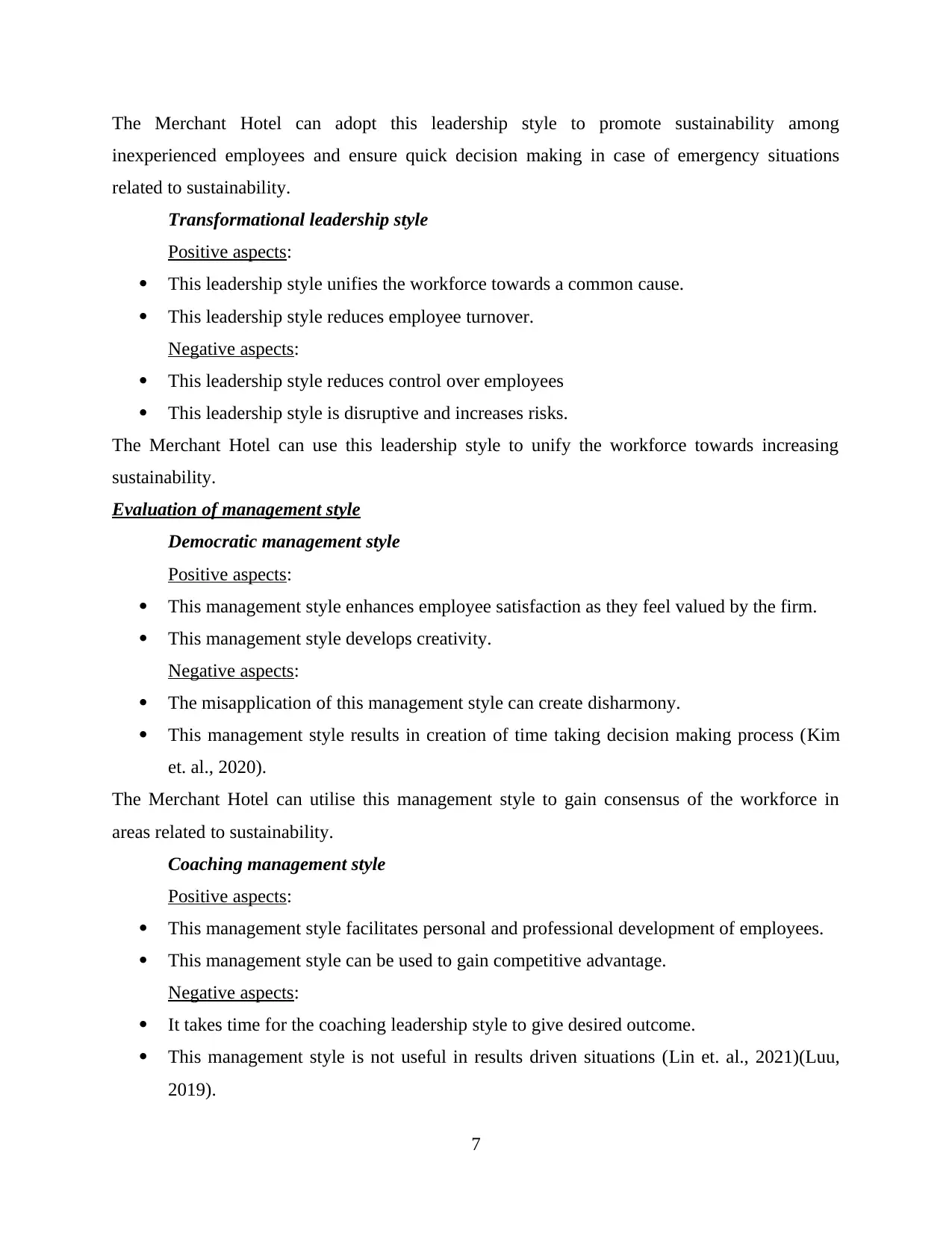
The Merchant Hotel can adopt this leadership style to promote sustainability among
inexperienced employees and ensure quick decision making in case of emergency situations
related to sustainability.
Transformational leadership style
Positive aspects:
This leadership style unifies the workforce towards a common cause.
This leadership style reduces employee turnover.
Negative aspects:
This leadership style reduces control over employees
This leadership style is disruptive and increases risks.
The Merchant Hotel can use this leadership style to unify the workforce towards increasing
sustainability.
Evaluation of management style
Democratic management style
Positive aspects:
This management style enhances employee satisfaction as they feel valued by the firm.
This management style develops creativity.
Negative aspects:
The misapplication of this management style can create disharmony.
This management style results in creation of time taking decision making process (Kim
et. al., 2020).
The Merchant Hotel can utilise this management style to gain consensus of the workforce in
areas related to sustainability.
Coaching management style
Positive aspects:
This management style facilitates personal and professional development of employees.
This management style can be used to gain competitive advantage.
Negative aspects:
It takes time for the coaching leadership style to give desired outcome.
This management style is not useful in results driven situations (Lin et. al., 2021)(Luu,
2019).
7
inexperienced employees and ensure quick decision making in case of emergency situations
related to sustainability.
Transformational leadership style
Positive aspects:
This leadership style unifies the workforce towards a common cause.
This leadership style reduces employee turnover.
Negative aspects:
This leadership style reduces control over employees
This leadership style is disruptive and increases risks.
The Merchant Hotel can use this leadership style to unify the workforce towards increasing
sustainability.
Evaluation of management style
Democratic management style
Positive aspects:
This management style enhances employee satisfaction as they feel valued by the firm.
This management style develops creativity.
Negative aspects:
The misapplication of this management style can create disharmony.
This management style results in creation of time taking decision making process (Kim
et. al., 2020).
The Merchant Hotel can utilise this management style to gain consensus of the workforce in
areas related to sustainability.
Coaching management style
Positive aspects:
This management style facilitates personal and professional development of employees.
This management style can be used to gain competitive advantage.
Negative aspects:
It takes time for the coaching leadership style to give desired outcome.
This management style is not useful in results driven situations (Lin et. al., 2021)(Luu,
2019).
7
Paraphrase This Document
Need a fresh take? Get an instant paraphrase of this document with our AI Paraphraser
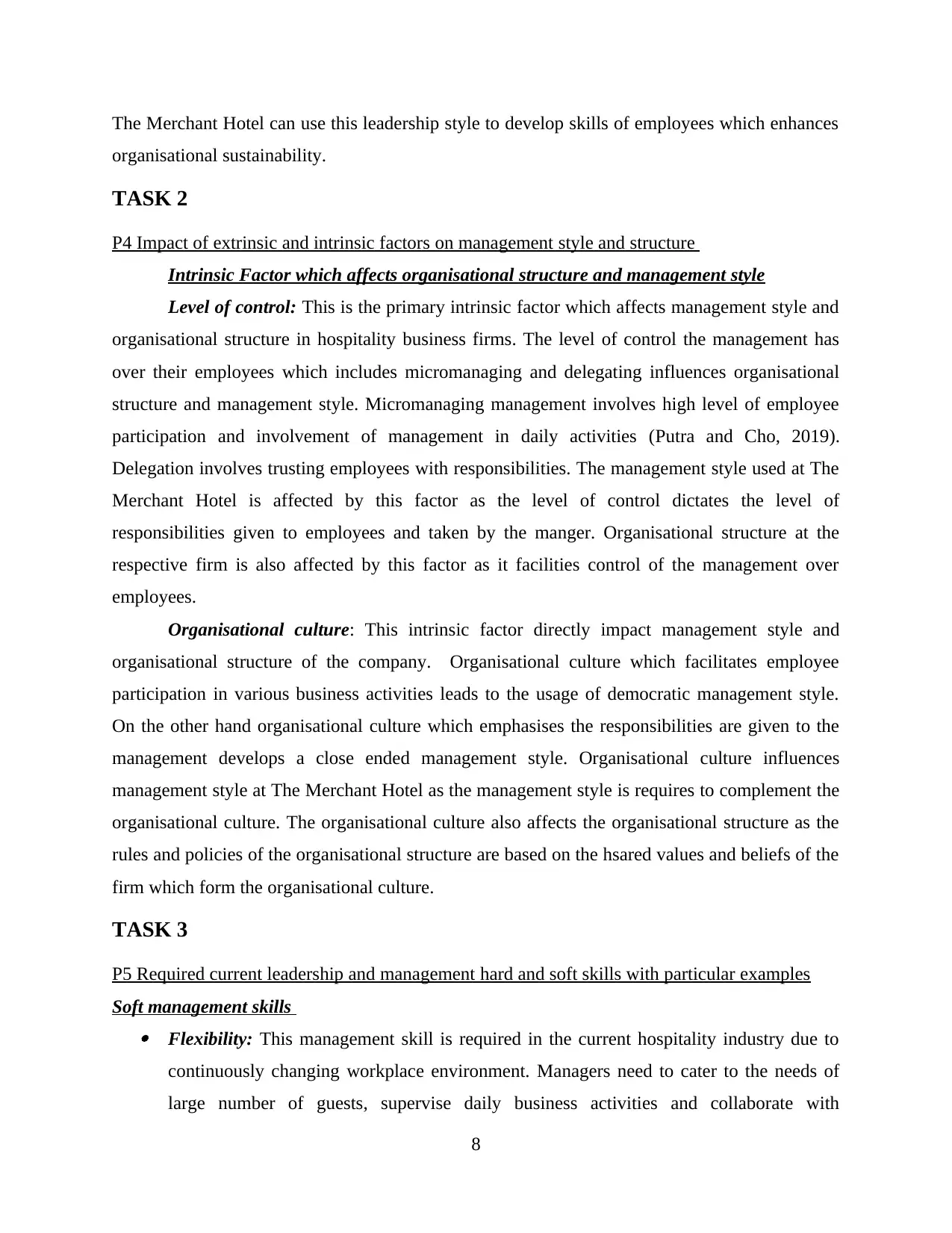
The Merchant Hotel can use this leadership style to develop skills of employees which enhances
organisational sustainability.
TASK 2
P4 Impact of extrinsic and intrinsic factors on management style and structure
Intrinsic Factor which affects organisational structure and management style
Level of control: This is the primary intrinsic factor which affects management style and
organisational structure in hospitality business firms. The level of control the management has
over their employees which includes micromanaging and delegating influences organisational
structure and management style. Micromanaging management involves high level of employee
participation and involvement of management in daily activities (Putra and Cho, 2019).
Delegation involves trusting employees with responsibilities. The management style used at The
Merchant Hotel is affected by this factor as the level of control dictates the level of
responsibilities given to employees and taken by the manger. Organisational structure at the
respective firm is also affected by this factor as it facilities control of the management over
employees.
Organisational culture: This intrinsic factor directly impact management style and
organisational structure of the company. Organisational culture which facilitates employee
participation in various business activities leads to the usage of democratic management style.
On the other hand organisational culture which emphasises the responsibilities are given to the
management develops a close ended management style. Organisational culture influences
management style at The Merchant Hotel as the management style is requires to complement the
organisational culture. The organisational culture also affects the organisational structure as the
rules and policies of the organisational structure are based on the hsared values and beliefs of the
firm which form the organisational culture.
TASK 3
P5 Required current leadership and management hard and soft skills with particular examples
Soft management skills Flexibility: This management skill is required in the current hospitality industry due to
continuously changing workplace environment. Managers need to cater to the needs of
large number of guests, supervise daily business activities and collaborate with
8
organisational sustainability.
TASK 2
P4 Impact of extrinsic and intrinsic factors on management style and structure
Intrinsic Factor which affects organisational structure and management style
Level of control: This is the primary intrinsic factor which affects management style and
organisational structure in hospitality business firms. The level of control the management has
over their employees which includes micromanaging and delegating influences organisational
structure and management style. Micromanaging management involves high level of employee
participation and involvement of management in daily activities (Putra and Cho, 2019).
Delegation involves trusting employees with responsibilities. The management style used at The
Merchant Hotel is affected by this factor as the level of control dictates the level of
responsibilities given to employees and taken by the manger. Organisational structure at the
respective firm is also affected by this factor as it facilities control of the management over
employees.
Organisational culture: This intrinsic factor directly impact management style and
organisational structure of the company. Organisational culture which facilitates employee
participation in various business activities leads to the usage of democratic management style.
On the other hand organisational culture which emphasises the responsibilities are given to the
management develops a close ended management style. Organisational culture influences
management style at The Merchant Hotel as the management style is requires to complement the
organisational culture. The organisational culture also affects the organisational structure as the
rules and policies of the organisational structure are based on the hsared values and beliefs of the
firm which form the organisational culture.
TASK 3
P5 Required current leadership and management hard and soft skills with particular examples
Soft management skills Flexibility: This management skill is required in the current hospitality industry due to
continuously changing workplace environment. Managers need to cater to the needs of
large number of guests, supervise daily business activities and collaborate with
8
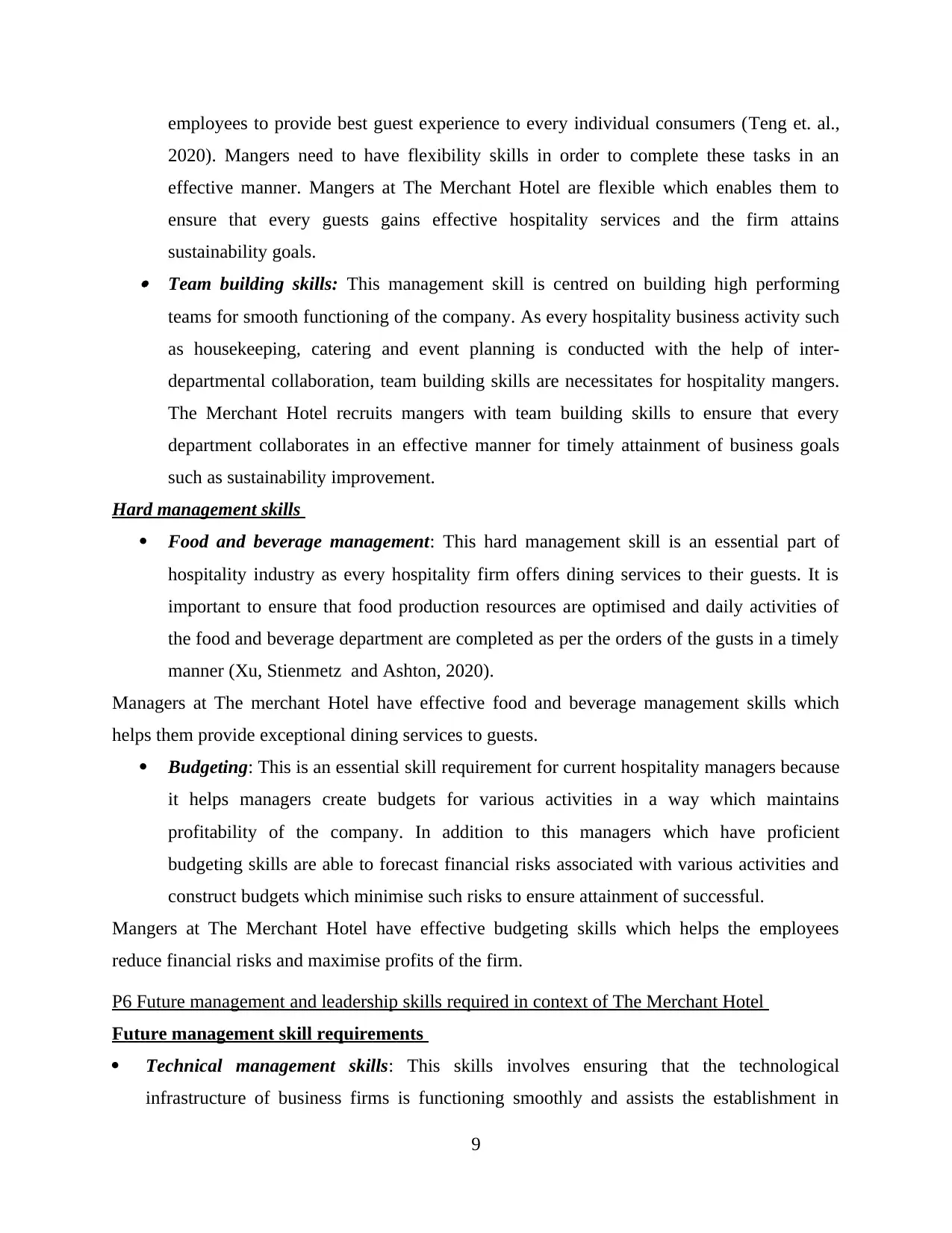
employees to provide best guest experience to every individual consumers (Teng et. al.,
2020). Mangers need to have flexibility skills in order to complete these tasks in an
effective manner. Mangers at The Merchant Hotel are flexible which enables them to
ensure that every guests gains effective hospitality services and the firm attains
sustainability goals. Team building skills: This management skill is centred on building high performing
teams for smooth functioning of the company. As every hospitality business activity such
as housekeeping, catering and event planning is conducted with the help of inter-
departmental collaboration, team building skills are necessitates for hospitality mangers.
The Merchant Hotel recruits mangers with team building skills to ensure that every
department collaborates in an effective manner for timely attainment of business goals
such as sustainability improvement.
Hard management skills
Food and beverage management: This hard management skill is an essential part of
hospitality industry as every hospitality firm offers dining services to their guests. It is
important to ensure that food production resources are optimised and daily activities of
the food and beverage department are completed as per the orders of the gusts in a timely
manner (Xu, Stienmetz and Ashton, 2020).
Managers at The merchant Hotel have effective food and beverage management skills which
helps them provide exceptional dining services to guests.
Budgeting: This is an essential skill requirement for current hospitality managers because
it helps managers create budgets for various activities in a way which maintains
profitability of the company. In addition to this managers which have proficient
budgeting skills are able to forecast financial risks associated with various activities and
construct budgets which minimise such risks to ensure attainment of successful.
Mangers at The Merchant Hotel have effective budgeting skills which helps the employees
reduce financial risks and maximise profits of the firm.
P6 Future management and leadership skills required in context of The Merchant Hotel
Future management skill requirements
Technical management skills: This skills involves ensuring that the technological
infrastructure of business firms is functioning smoothly and assists the establishment in
9
2020). Mangers need to have flexibility skills in order to complete these tasks in an
effective manner. Mangers at The Merchant Hotel are flexible which enables them to
ensure that every guests gains effective hospitality services and the firm attains
sustainability goals. Team building skills: This management skill is centred on building high performing
teams for smooth functioning of the company. As every hospitality business activity such
as housekeeping, catering and event planning is conducted with the help of inter-
departmental collaboration, team building skills are necessitates for hospitality mangers.
The Merchant Hotel recruits mangers with team building skills to ensure that every
department collaborates in an effective manner for timely attainment of business goals
such as sustainability improvement.
Hard management skills
Food and beverage management: This hard management skill is an essential part of
hospitality industry as every hospitality firm offers dining services to their guests. It is
important to ensure that food production resources are optimised and daily activities of
the food and beverage department are completed as per the orders of the gusts in a timely
manner (Xu, Stienmetz and Ashton, 2020).
Managers at The merchant Hotel have effective food and beverage management skills which
helps them provide exceptional dining services to guests.
Budgeting: This is an essential skill requirement for current hospitality managers because
it helps managers create budgets for various activities in a way which maintains
profitability of the company. In addition to this managers which have proficient
budgeting skills are able to forecast financial risks associated with various activities and
construct budgets which minimise such risks to ensure attainment of successful.
Mangers at The Merchant Hotel have effective budgeting skills which helps the employees
reduce financial risks and maximise profits of the firm.
P6 Future management and leadership skills required in context of The Merchant Hotel
Future management skill requirements
Technical management skills: This skills involves ensuring that the technological
infrastructure of business firms is functioning smoothly and assists the establishment in
9
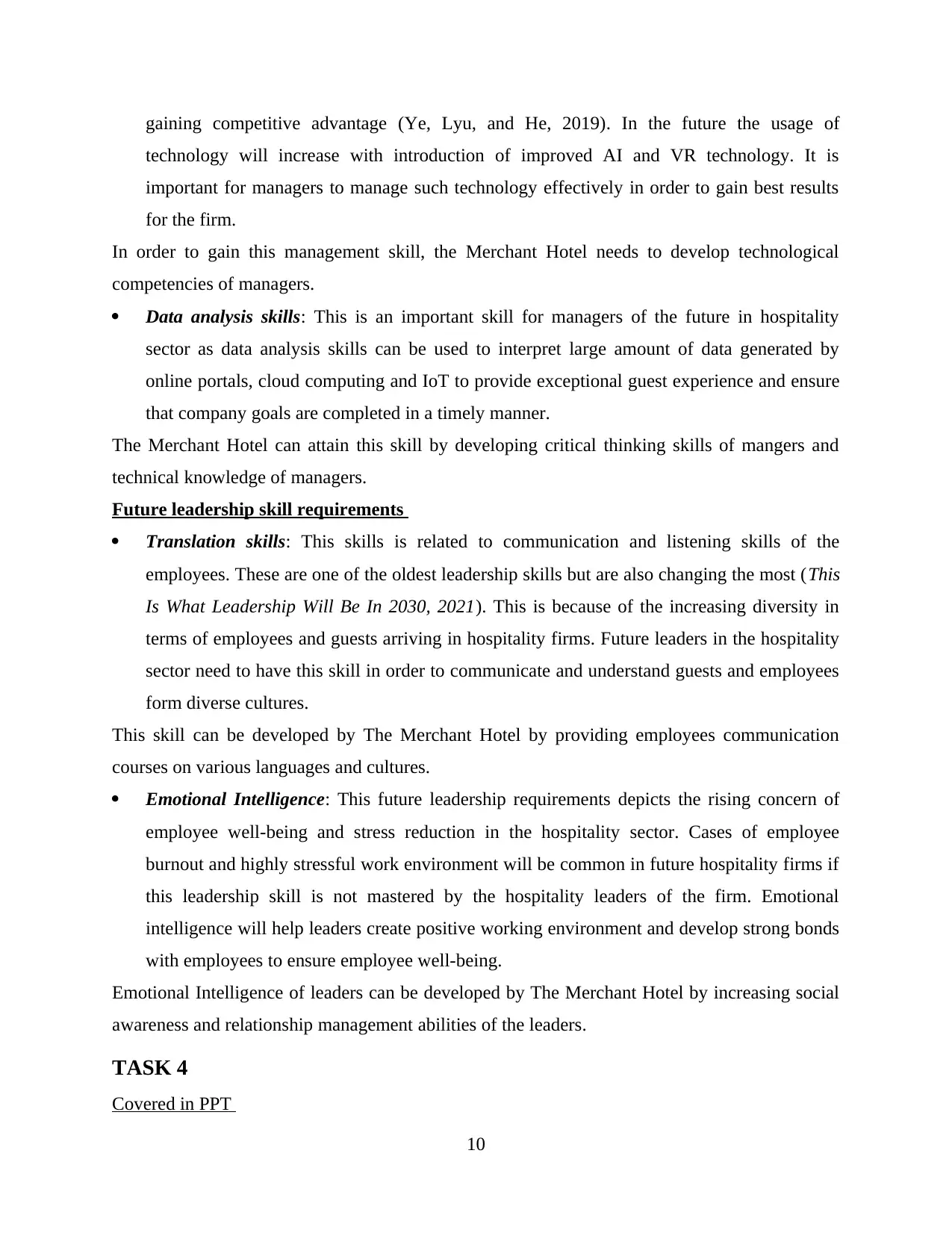
gaining competitive advantage (Ye, Lyu, and He, 2019). In the future the usage of
technology will increase with introduction of improved AI and VR technology. It is
important for managers to manage such technology effectively in order to gain best results
for the firm.
In order to gain this management skill, the Merchant Hotel needs to develop technological
competencies of managers.
Data analysis skills: This is an important skill for managers of the future in hospitality
sector as data analysis skills can be used to interpret large amount of data generated by
online portals, cloud computing and IoT to provide exceptional guest experience and ensure
that company goals are completed in a timely manner.
The Merchant Hotel can attain this skill by developing critical thinking skills of mangers and
technical knowledge of managers.
Future leadership skill requirements
Translation skills: This skills is related to communication and listening skills of the
employees. These are one of the oldest leadership skills but are also changing the most (This
Is What Leadership Will Be In 2030, 2021). This is because of the increasing diversity in
terms of employees and guests arriving in hospitality firms. Future leaders in the hospitality
sector need to have this skill in order to communicate and understand guests and employees
form diverse cultures.
This skill can be developed by The Merchant Hotel by providing employees communication
courses on various languages and cultures.
Emotional Intelligence: This future leadership requirements depicts the rising concern of
employee well-being and stress reduction in the hospitality sector. Cases of employee
burnout and highly stressful work environment will be common in future hospitality firms if
this leadership skill is not mastered by the hospitality leaders of the firm. Emotional
intelligence will help leaders create positive working environment and develop strong bonds
with employees to ensure employee well-being.
Emotional Intelligence of leaders can be developed by The Merchant Hotel by increasing social
awareness and relationship management abilities of the leaders.
TASK 4
Covered in PPT
10
technology will increase with introduction of improved AI and VR technology. It is
important for managers to manage such technology effectively in order to gain best results
for the firm.
In order to gain this management skill, the Merchant Hotel needs to develop technological
competencies of managers.
Data analysis skills: This is an important skill for managers of the future in hospitality
sector as data analysis skills can be used to interpret large amount of data generated by
online portals, cloud computing and IoT to provide exceptional guest experience and ensure
that company goals are completed in a timely manner.
The Merchant Hotel can attain this skill by developing critical thinking skills of mangers and
technical knowledge of managers.
Future leadership skill requirements
Translation skills: This skills is related to communication and listening skills of the
employees. These are one of the oldest leadership skills but are also changing the most (This
Is What Leadership Will Be In 2030, 2021). This is because of the increasing diversity in
terms of employees and guests arriving in hospitality firms. Future leaders in the hospitality
sector need to have this skill in order to communicate and understand guests and employees
form diverse cultures.
This skill can be developed by The Merchant Hotel by providing employees communication
courses on various languages and cultures.
Emotional Intelligence: This future leadership requirements depicts the rising concern of
employee well-being and stress reduction in the hospitality sector. Cases of employee
burnout and highly stressful work environment will be common in future hospitality firms if
this leadership skill is not mastered by the hospitality leaders of the firm. Emotional
intelligence will help leaders create positive working environment and develop strong bonds
with employees to ensure employee well-being.
Emotional Intelligence of leaders can be developed by The Merchant Hotel by increasing social
awareness and relationship management abilities of the leaders.
TASK 4
Covered in PPT
10
Secure Best Marks with AI Grader
Need help grading? Try our AI Grader for instant feedback on your assignments.
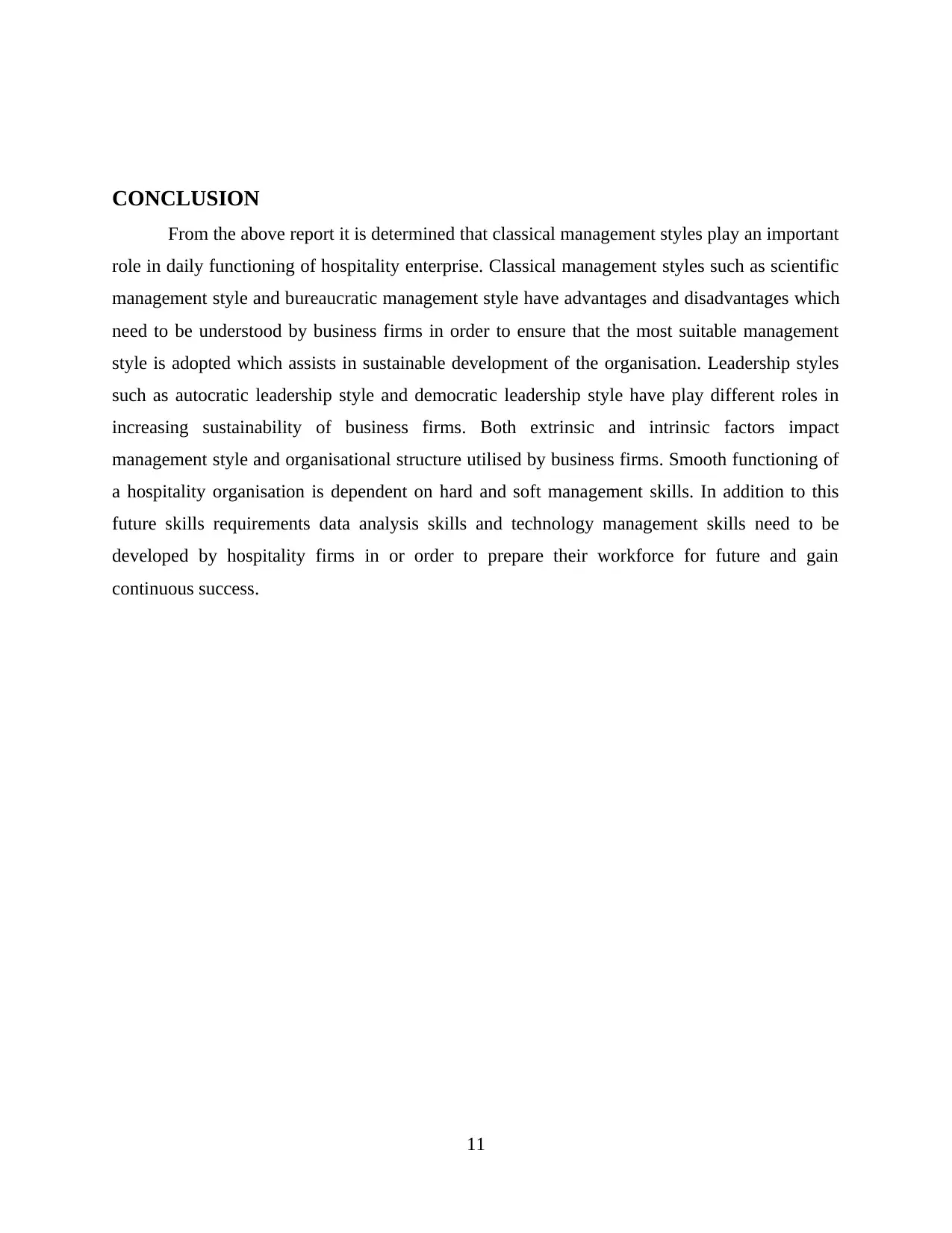
CONCLUSION
From the above report it is determined that classical management styles play an important
role in daily functioning of hospitality enterprise. Classical management styles such as scientific
management style and bureaucratic management style have advantages and disadvantages which
need to be understood by business firms in order to ensure that the most suitable management
style is adopted which assists in sustainable development of the organisation. Leadership styles
such as autocratic leadership style and democratic leadership style have play different roles in
increasing sustainability of business firms. Both extrinsic and intrinsic factors impact
management style and organisational structure utilised by business firms. Smooth functioning of
a hospitality organisation is dependent on hard and soft management skills. In addition to this
future skills requirements data analysis skills and technology management skills need to be
developed by hospitality firms in or order to prepare their workforce for future and gain
continuous success.
11
From the above report it is determined that classical management styles play an important
role in daily functioning of hospitality enterprise. Classical management styles such as scientific
management style and bureaucratic management style have advantages and disadvantages which
need to be understood by business firms in order to ensure that the most suitable management
style is adopted which assists in sustainable development of the organisation. Leadership styles
such as autocratic leadership style and democratic leadership style have play different roles in
increasing sustainability of business firms. Both extrinsic and intrinsic factors impact
management style and organisational structure utilised by business firms. Smooth functioning of
a hospitality organisation is dependent on hard and soft management skills. In addition to this
future skills requirements data analysis skills and technology management skills need to be
developed by hospitality firms in or order to prepare their workforce for future and gain
continuous success.
11
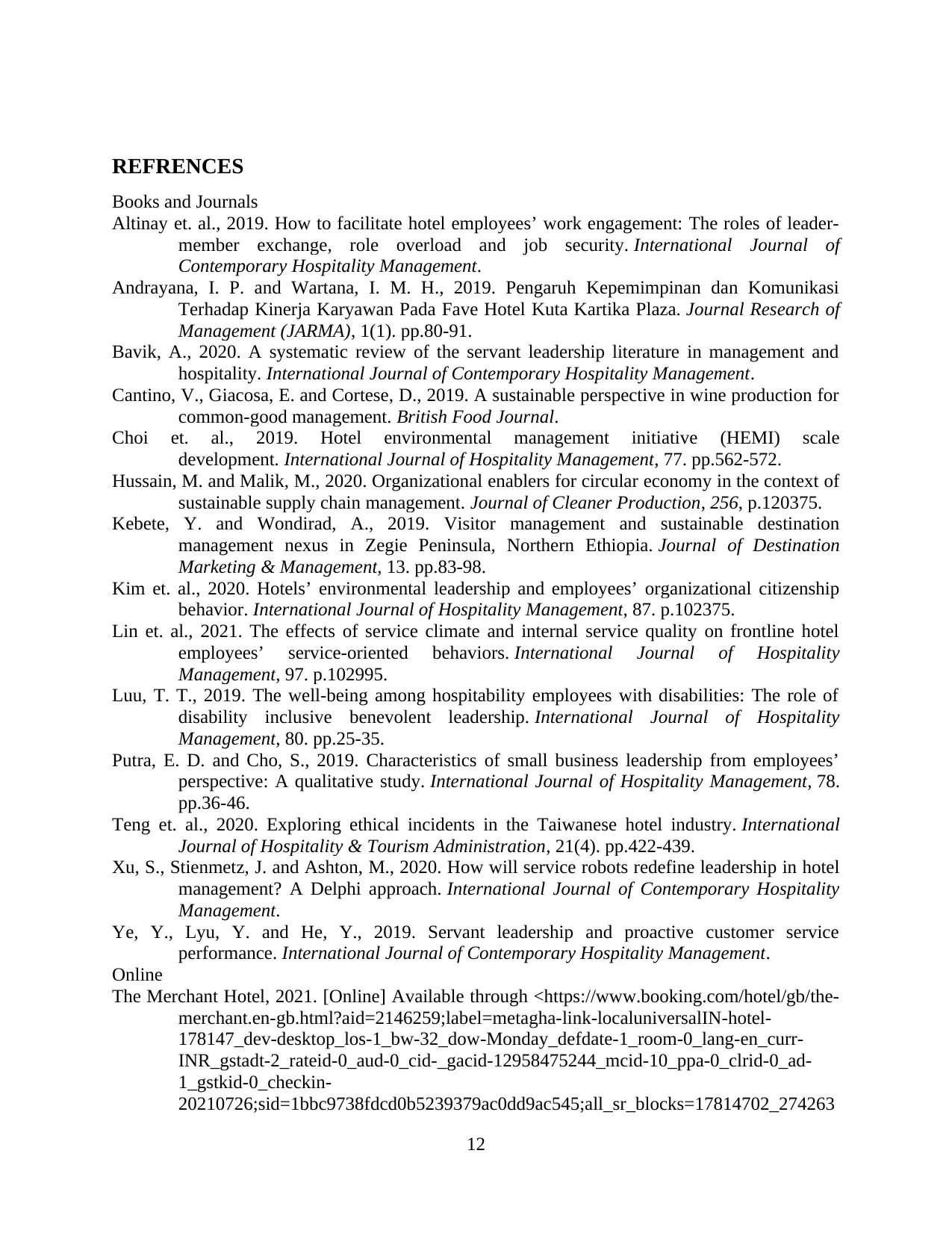
REFRENCES
Books and Journals
Altinay et. al., 2019. How to facilitate hotel employees’ work engagement: The roles of leader-
member exchange, role overload and job security. International Journal of
Contemporary Hospitality Management.
Andrayana, I. P. and Wartana, I. M. H., 2019. Pengaruh Kepemimpinan dan Komunikasi
Terhadap Kinerja Karyawan Pada Fave Hotel Kuta Kartika Plaza. Journal Research of
Management (JARMA), 1(1). pp.80-91.
Bavik, A., 2020. A systematic review of the servant leadership literature in management and
hospitality. International Journal of Contemporary Hospitality Management.
Cantino, V., Giacosa, E. and Cortese, D., 2019. A sustainable perspective in wine production for
common-good management. British Food Journal.
Choi et. al., 2019. Hotel environmental management initiative (HEMI) scale
development. International Journal of Hospitality Management, 77. pp.562-572.
Hussain, M. and Malik, M., 2020. Organizational enablers for circular economy in the context of
sustainable supply chain management. Journal of Cleaner Production, 256, p.120375.
Kebete, Y. and Wondirad, A., 2019. Visitor management and sustainable destination
management nexus in Zegie Peninsula, Northern Ethiopia. Journal of Destination
Marketing & Management, 13. pp.83-98.
Kim et. al., 2020. Hotels’ environmental leadership and employees’ organizational citizenship
behavior. International Journal of Hospitality Management, 87. p.102375.
Lin et. al., 2021. The effects of service climate and internal service quality on frontline hotel
employees’ service-oriented behaviors. International Journal of Hospitality
Management, 97. p.102995.
Luu, T. T., 2019. The well-being among hospitability employees with disabilities: The role of
disability inclusive benevolent leadership. International Journal of Hospitality
Management, 80. pp.25-35.
Putra, E. D. and Cho, S., 2019. Characteristics of small business leadership from employees’
perspective: A qualitative study. International Journal of Hospitality Management, 78.
pp.36-46.
Teng et. al., 2020. Exploring ethical incidents in the Taiwanese hotel industry. International
Journal of Hospitality & Tourism Administration, 21(4). pp.422-439.
Xu, S., Stienmetz, J. and Ashton, M., 2020. How will service robots redefine leadership in hotel
management? A Delphi approach. International Journal of Contemporary Hospitality
Management.
Ye, Y., Lyu, Y. and He, Y., 2019. Servant leadership and proactive customer service
performance. International Journal of Contemporary Hospitality Management.
Online
The Merchant Hotel, 2021. [Online] Available through <https://www.booking.com/hotel/gb/the-
merchant.en-gb.html?aid=2146259;label=metagha-link-localuniversalIN-hotel-
178147_dev-desktop_los-1_bw-32_dow-Monday_defdate-1_room-0_lang-en_curr-
INR_gstadt-2_rateid-0_aud-0_cid-_gacid-12958475244_mcid-10_ppa-0_clrid-0_ad-
1_gstkid-0_checkin-
20210726;sid=1bbc9738fdcd0b5239379ac0dd9ac545;all_sr_blocks=17814702_274263
12
Books and Journals
Altinay et. al., 2019. How to facilitate hotel employees’ work engagement: The roles of leader-
member exchange, role overload and job security. International Journal of
Contemporary Hospitality Management.
Andrayana, I. P. and Wartana, I. M. H., 2019. Pengaruh Kepemimpinan dan Komunikasi
Terhadap Kinerja Karyawan Pada Fave Hotel Kuta Kartika Plaza. Journal Research of
Management (JARMA), 1(1). pp.80-91.
Bavik, A., 2020. A systematic review of the servant leadership literature in management and
hospitality. International Journal of Contemporary Hospitality Management.
Cantino, V., Giacosa, E. and Cortese, D., 2019. A sustainable perspective in wine production for
common-good management. British Food Journal.
Choi et. al., 2019. Hotel environmental management initiative (HEMI) scale
development. International Journal of Hospitality Management, 77. pp.562-572.
Hussain, M. and Malik, M., 2020. Organizational enablers for circular economy in the context of
sustainable supply chain management. Journal of Cleaner Production, 256, p.120375.
Kebete, Y. and Wondirad, A., 2019. Visitor management and sustainable destination
management nexus in Zegie Peninsula, Northern Ethiopia. Journal of Destination
Marketing & Management, 13. pp.83-98.
Kim et. al., 2020. Hotels’ environmental leadership and employees’ organizational citizenship
behavior. International Journal of Hospitality Management, 87. p.102375.
Lin et. al., 2021. The effects of service climate and internal service quality on frontline hotel
employees’ service-oriented behaviors. International Journal of Hospitality
Management, 97. p.102995.
Luu, T. T., 2019. The well-being among hospitability employees with disabilities: The role of
disability inclusive benevolent leadership. International Journal of Hospitality
Management, 80. pp.25-35.
Putra, E. D. and Cho, S., 2019. Characteristics of small business leadership from employees’
perspective: A qualitative study. International Journal of Hospitality Management, 78.
pp.36-46.
Teng et. al., 2020. Exploring ethical incidents in the Taiwanese hotel industry. International
Journal of Hospitality & Tourism Administration, 21(4). pp.422-439.
Xu, S., Stienmetz, J. and Ashton, M., 2020. How will service robots redefine leadership in hotel
management? A Delphi approach. International Journal of Contemporary Hospitality
Management.
Ye, Y., Lyu, Y. and He, Y., 2019. Servant leadership and proactive customer service
performance. International Journal of Contemporary Hospitality Management.
Online
The Merchant Hotel, 2021. [Online] Available through <https://www.booking.com/hotel/gb/the-
merchant.en-gb.html?aid=2146259;label=metagha-link-localuniversalIN-hotel-
178147_dev-desktop_los-1_bw-32_dow-Monday_defdate-1_room-0_lang-en_curr-
INR_gstadt-2_rateid-0_aud-0_cid-_gacid-12958475244_mcid-10_ppa-0_clrid-0_ad-
1_gstkid-0_checkin-
20210726;sid=1bbc9738fdcd0b5239379ac0dd9ac545;all_sr_blocks=17814702_274263
12
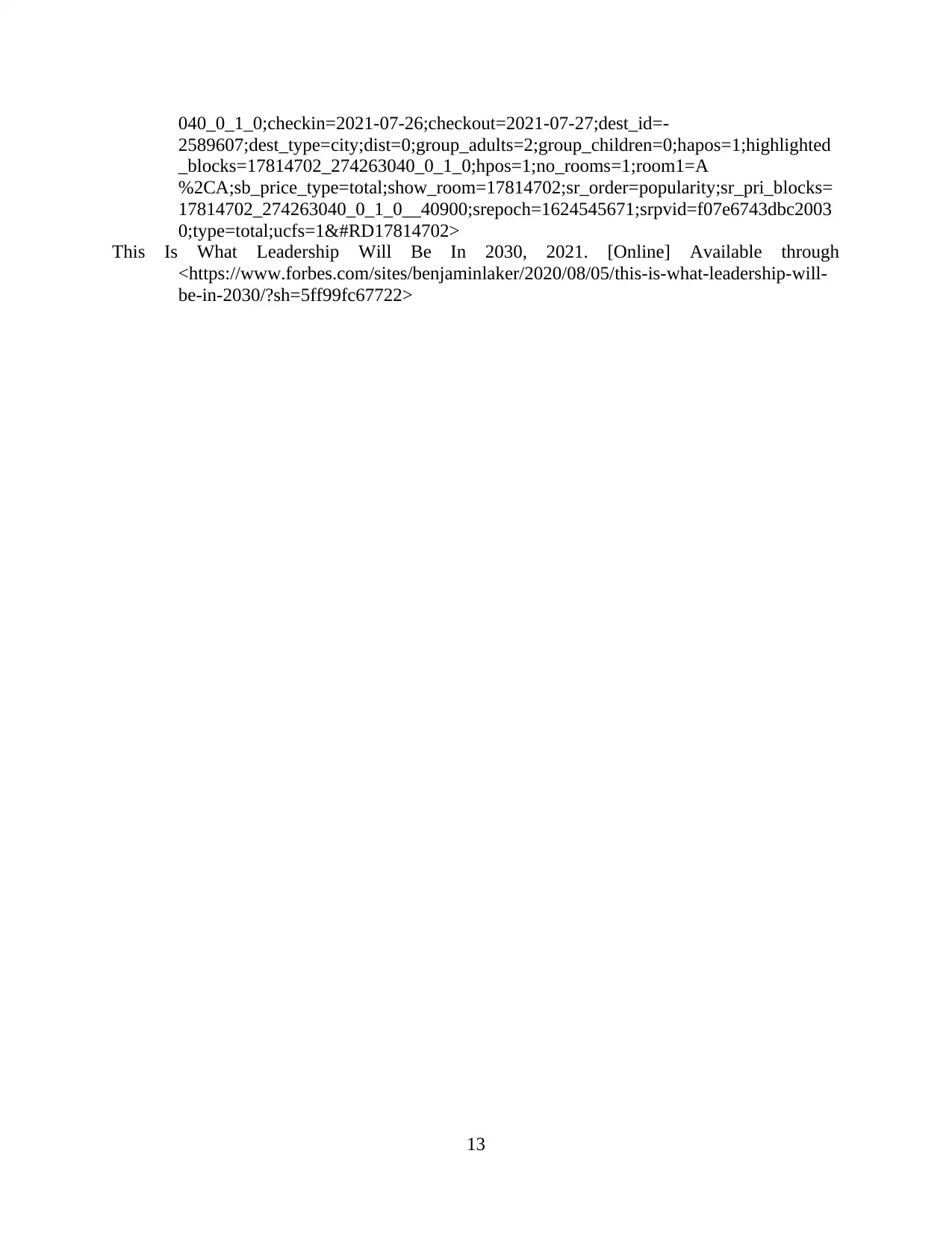
040_0_1_0;checkin=2021-07-26;checkout=2021-07-27;dest_id=-
2589607;dest_type=city;dist=0;group_adults=2;group_children=0;hapos=1;highlighted
_blocks=17814702_274263040_0_1_0;hpos=1;no_rooms=1;room1=A
%2CA;sb_price_type=total;show_room=17814702;sr_order=popularity;sr_pri_blocks=
17814702_274263040_0_1_0__40900;srepoch=1624545671;srpvid=f07e6743dbc2003
0;type=total;ucfs=1&#RD17814702>
This Is What Leadership Will Be In 2030, 2021. [Online] Available through
<https://www.forbes.com/sites/benjaminlaker/2020/08/05/this-is-what-leadership-will-
be-in-2030/?sh=5ff99fc67722>
13
2589607;dest_type=city;dist=0;group_adults=2;group_children=0;hapos=1;highlighted
_blocks=17814702_274263040_0_1_0;hpos=1;no_rooms=1;room1=A
%2CA;sb_price_type=total;show_room=17814702;sr_order=popularity;sr_pri_blocks=
17814702_274263040_0_1_0__40900;srepoch=1624545671;srpvid=f07e6743dbc2003
0;type=total;ucfs=1&#RD17814702>
This Is What Leadership Will Be In 2030, 2021. [Online] Available through
<https://www.forbes.com/sites/benjaminlaker/2020/08/05/this-is-what-leadership-will-
be-in-2030/?sh=5ff99fc67722>
13
1 out of 13
Related Documents
Your All-in-One AI-Powered Toolkit for Academic Success.
+13062052269
info@desklib.com
Available 24*7 on WhatsApp / Email
![[object Object]](/_next/static/media/star-bottom.7253800d.svg)
Unlock your academic potential
© 2024 | Zucol Services PVT LTD | All rights reserved.




